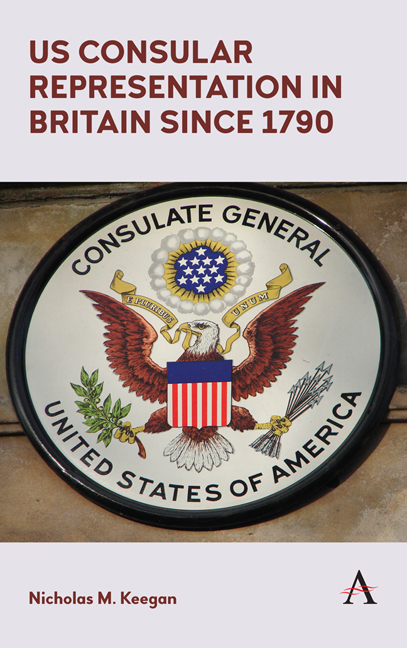Book contents
- Frontmatter
- Dedication
- Contents
- List of Illustrations
- Foreword
- Preface
- Acknowledgements
- Introduction
- PART 1
- PART 2
- PART 3
- Chapter Six Consular Posts and Consular Agencies in Major Cities
- Chapter Seven Belfast
- Chapter Eight Birmingham
- Chapter Nine Bradford
- Chapter Ten Bristol
- Chapter Eleven Cardiff
- Chapter Twelve Dublin
- Chapter Thirteen Dundee
- Chapter Fourteen Dunfermline
- Chapter Fifteen Edinburgh and Leith
- Chapter Sixteen Falmouth
- Chapter Seventeen Liverpool
- Chapter Eighteen London
- Chapter Nineteen Newcastle upon Tyne
- Chapter Twenty Southampton
- Chapter Twenty-One Stoke on Trent
- Chapter Twenty-Two An Evolving, Adaptive Service
- Appendix: Locations and Categories of Consular Offices
- Notes
- Sources
- Bibliography
- Index
Chapter Twelve - Dublin
from PART 3
Published online by Cambridge University Press: 21 June 2018
- Frontmatter
- Dedication
- Contents
- List of Illustrations
- Foreword
- Preface
- Acknowledgements
- Introduction
- PART 1
- PART 2
- PART 3
- Chapter Six Consular Posts and Consular Agencies in Major Cities
- Chapter Seven Belfast
- Chapter Eight Birmingham
- Chapter Nine Bradford
- Chapter Ten Bristol
- Chapter Eleven Cardiff
- Chapter Twelve Dublin
- Chapter Thirteen Dundee
- Chapter Fourteen Dunfermline
- Chapter Fifteen Edinburgh and Leith
- Chapter Sixteen Falmouth
- Chapter Seventeen Liverpool
- Chapter Eighteen London
- Chapter Nineteen Newcastle upon Tyne
- Chapter Twenty Southampton
- Chapter Twenty-One Stoke on Trent
- Chapter Twenty-Two An Evolving, Adaptive Service
- Appendix: Locations and Categories of Consular Offices
- Notes
- Sources
- Bibliography
- Index
Summary
Dublin, together with Liverpool, was among the first consulates established in Britain by the new US republic in 1790, and at that time Ireland was still part of Britain. William Knox of New York was appointed consul and arrived on 24 November, thereby just missing by a few months the distinction of being the first American consul in Britain, as James Maury began his appointment at Liverpool in September. As an example of the ill-preparedness of the new Consular Service, one of Knox's first purchases a week or two after arrival was commissioning a local engraver to manufacture a consular seal in brass. This should already have been issued to him on appointment.
Knox's performance seems to have been somewhat erratic. Writing from Cork less than a year after taking up his appointment, he informed Secretary of State Thomas Jefferson that: ‘Business of an indispensable but private nature having required me to be England [sic] for some time past has been the cause of your not receiving in due course the return directed in the Instructions I had the honor to receive from you.’ However, he promised that as soon as he returned to Dublin he would send a report on the arrivals of American ships during 1791. He also hoped that the government would make provision for payments to their consuls, as was the custom of other countries: ‘for my own part were my private resources such as to admit of it, I should with great cheerfulness serve our country without any pecuniary consideration’. Two months later, he sent a long letter to President Washington informing him of how friendly Ireland was towards the United States and of the many contacts he had made. He continued at length about his financial difficulties (which was probably the main reason for the letter).
Not being possessed of a fortune I was only capable of taking with me [to Ireland] a temporary
supply of the means for my support, trusting that Congress during the last session
would have passed a Consular Act, which would have embraced a provision for their consuls;
but I find I have calculated erroneously, and that error (although I hope not criminal) has
involved me in much anxiety for my support in this country.
- Type
- Chapter
- Information
- US Consular Representation in Britain since 1790 , pp. 125 - 134Publisher: Anthem PressPrint publication year: 2018

